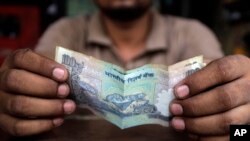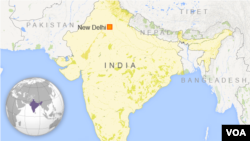India, one of the handful of countries that continued to trade with Iran despite tight sanctions, hopes to reap significant, long term benefits when Tehran’s nuclear deal with major powers is implemented. However, its exporters are also bracing for tougher competition from Western companies.
In the last three years, Pankaj Bansal says the exports of his trading firm, TMA International in New Delhi, increased by almost 40 percent.
But the days of runaway business growth could be ending. With sanctions on Iran likely to ease, Bansal is bracing for a tougher environment.
He says he is working overtime to scout for new markets and expand his product basket, which includes metals and engineering goods.
“In some of the items we are definitely expecting a hit. In case of highly advanced technological items, we are going to be impacted, because traditionally Iran looks towards Western countries for high technology items,” he said.
Rupee trade
In recent years, tight sanctions forced India to slash oil imports from Tehran. But New Delhi, which has a longtime friendship with Tehran, bought crude worth almost $9 billion annually by paying partly in rupees. Tehran used the Indian currency to fund imports from India.
In just three years, the rupee trade helped Indian businesses double their exports to Iran to about $5 billion.
But trade analysts say firms from countries like Germany, France and others will be back when the nuclear deal goes through, selling everything from clothes to cars and bidding for big industrial and infrastructure projects that Indian firms had been eyeing.
Industrial projects might suffer
Rafique Ahmed, who heads the Federation of Indian Export Organizations, agrees that plans to build cement factories and other industrial projects might suffer.
But he is hopeful that new opportunities will open up for bigger Indian companies, particularly in the information technology, pharmaceutical and consumer sectors.
“Many of the multinational companies in India who wanted to sell, they had a demand there, but they did not want to go into the market. Now they are free to go. People remember the brands, some of them,” he said.
Transit routes via Iran
Analysts also point out that despite facing more competition, India is likely to make huge gains in the long term with the development of new transit routes by way of Iran.
The key to this is India’s plans to build container and cargo terminals at the Chabahar port in southeast Iran, a project India began pushing even before the nuclear deal was signed.
Former diplomat Neelam Deo at Gateway House in Mumbai, says the Chabahar port project will open up a new trading route to Afghanistan and Central Asian republics by giving India access to these landlocked countries.
“It is geo strategically a very important project for India. India has not been able to make any progress partly because of international sanctions which precluded the formation of an international consortium or even for India to by itself develop this port. India does need to move quickly, there have been some murmurs, that China is also offering to develop the same port,” said Neelam Deo.
Undersea pipeline
Another project that New Delhi hopes to fast track (expedite) is an undersea pipeline project that would bring Iranian gas to India’s west coast by way of the Arabian Sea, bypassing Pakistan.
The project could be significant for India because plans to bring Iranian gas by an overland pipeline running through Pakistan have made little headway.
Subodh Kumar Jain, director of South Asia Gas Enterprises Private Ltd, which is spearheading the undersea pipeline project, says things look very positive at the moment.
“We are very confident that such projects will move on a fast track in a couple of months. The good part is India has a lot of demand for gas,” he said.
India, which imports 75 percent of its oil, will also benefit if crude prices fall further — which could happen when Tehran oil comes on the market.






